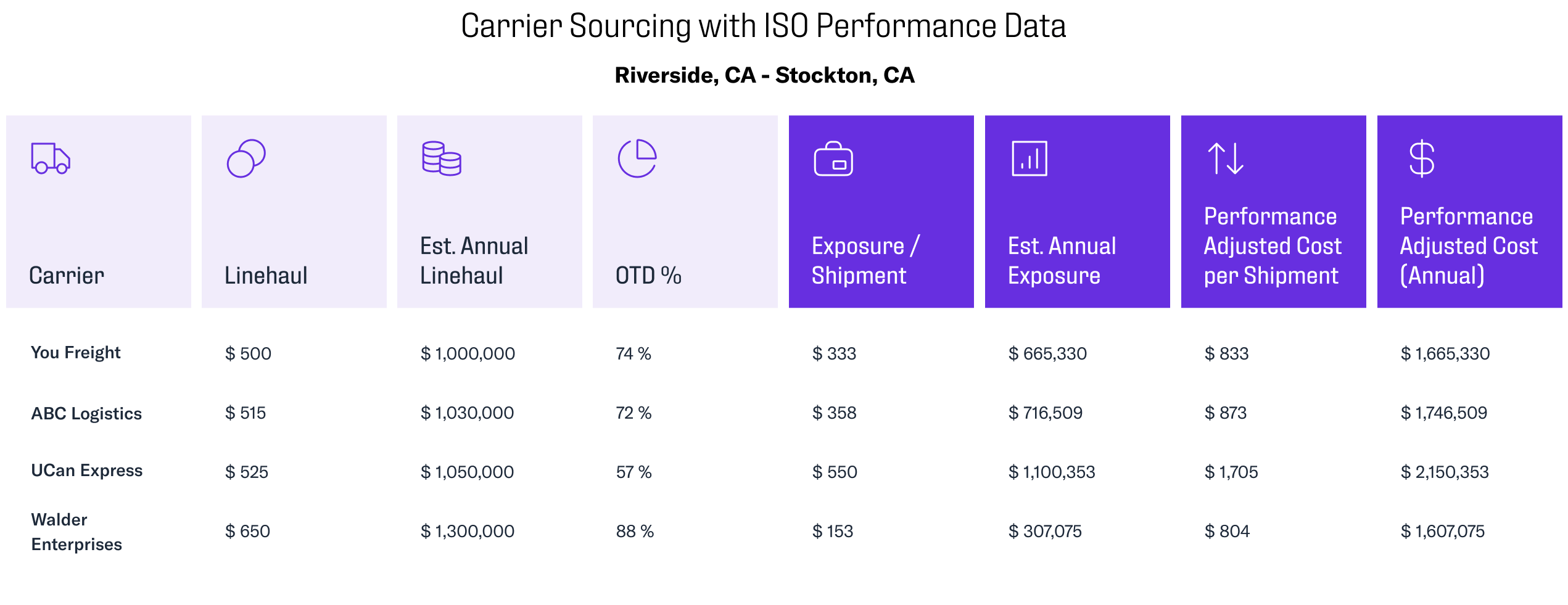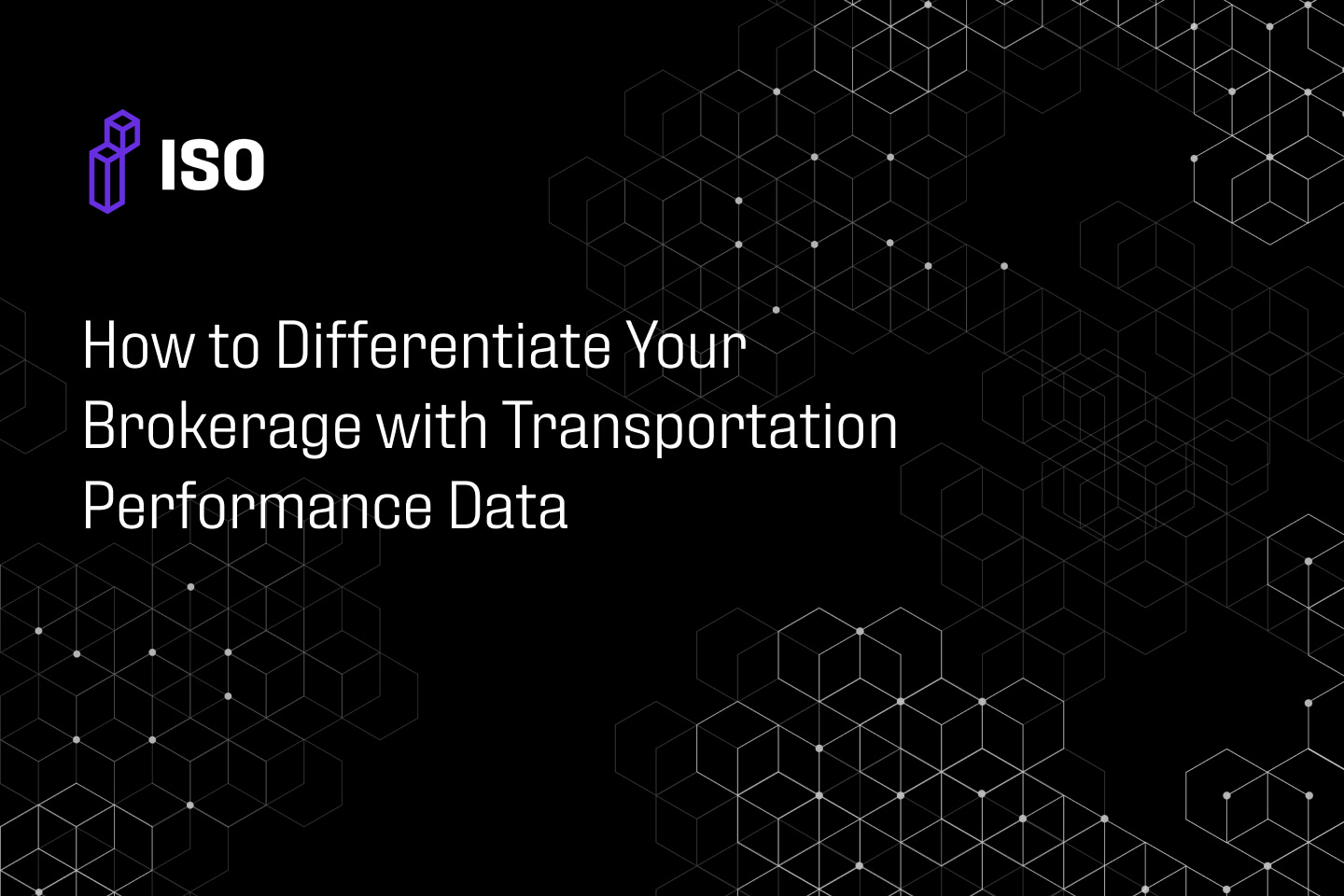Freight brokers play a crucial role in helping businesses streamline their operations and improve their bottom line. However, standing out from the crowd can be challenging with so many brokers competing for the same clients. As the transportation industry evolves and technology makes the bidding process more automated, freight brokers must find new ways to differentiate themselves from the competition and showcase these differences to prospective buyers.
With pricing as competitive as ever, the best way for brokers to differentiate themselves is through superior service-level performance. Brokers should turn to transportation performance data to prove they stand above the rest because anyone can claim to service a lane more reliably than their competitors. In this article, we’ll explore what transportation performance data is, why it matters, and how to use it to set your brokerage apart from the competition.
What is Transportation Performance Data?
Transportation performance data is the collection of shipment and order metrics on everything from cost to customer service that helps operations understand how adequately they are meeting the demands of their customers and internal programs. These metrics include on-time delivery and pick-up rates, tender acceptance metrics, driver performance, and total landed cost, among others. Brokers can gain insights into how their transportation network is performing and identify areas for improvement by analyzing this performance data.
Below is a sample transportation performance data set. You can see how much more context you have once you account for service-level performance metrics.

Why Does Transportation Performance Data Matter?
Transportation performance data is essential for freight brokers because it allows them to understand their strengths and weaknesses relative to the market beyond the basics, like lane costs. Savvy brokers can use this service-level information to earn more business by selling into their areas of strength and avoiding lanes or carriers they know won’t meet customer expectations.
Additionally, by collecting and analyzing transportation performance data, brokerages can identify opportunities to optimize their operations and deliver better results for their clients. This data can also help brokers identify potential issues before they become major problems, allowing them to proactively address bottlenecks and minimize disruptions to their clients’ supply chains. Brokers with access to reliable transportation performance data can make more data-driven decisions and rely less on legacy knowledge to optimize their operations.
How to Leverage Transportation Performance Data to Differentiate Your Freight Brokerage
Now that we understand what transportation performance data is and why it matters, let’s explore how you can use it to differentiate your brokerage:
Use Data to Identify Opportunities for Improvement
By analyzing transportation performance data, your brokerage can identify areas where you can improve operations. For example, suppose your brokerage on-time delivery rates are lower than the approved threshold for a customer. You can dig into transportation performance data to understand the underlying reason codes for late deliveries and take steps to address the issue(s). By consistently improving your transportation network, your brokerage can offer clients better service and results.
Demonstrate a Commitment to Service
Now, more than ever, supply chains are extensions of a company brand. As a result, expectations for service are high, and shippers and retailers expect their partners to deliver on agreed-upon commitments. By investing in transportation performance data and analysis, your brokerage can demonstrate to customers and prospects that service is a priority for your business.
In addition, your brokerage is likely already receiving customer scorecards regularly and auditing the data to ensure your KPIs are correct. By proactively collecting transportation performance data, your team can gather supporting documentation and preemptively address service failures that may reduce your score.
Sell into Your Strengths (and Avoid Your Weaknesses)
By sharing data that shows your on-time delivery rates, transit times, and other key metrics, your brokerage can prove that you deliver results. Rather than sending generic outreach emails promising better service than your competitors, get specific and highlight lanes, regions, and historical performance levels that set your brokerage apart. This data can help you stand out from competitors who may not have the same level of performance or the specifics to back up their claims.
To that same end, you should also leverage performance data to identify your weakest lanes, KPIs, or consignees and avoid soliciting business in these areas until your brokerage can correct network gaps.
Become a Trusted Advisor to Your Customers
Solidify your position as an essential vendor by becoming a trusted advisor to your customers. By diving into your transportation performance data, your brokerage can identify customer operations bottlenecks. For example, say you notice a pattern of late pick-ups from a particular facility due to the product not being ready. With performance data, you can approach your customer with this insight and make strategic recommendations to improve your relationship.
Leverage Technology to Improve Performance
Your brokerage can collect and analyze transportation performance data more effectively by investing in technology like logistics performance intelligence platforms, benchmarking solutions, and predictive analytics. These tools can help eliminate manual or repetitive tasks, reduce human error, and streamline collaboration between colleagues and partners.
Performance benchmarks allow you to know where your brokerage stands relative to the industry and to compare carriers across networks. These benchmarks can also justify pricing or reinforce why prospects should give you their business.
One transportation performance technology provider is Isometric Technologies (ISO), the first neutral platform for shippers, brokers, and carriers to reconcile transportation performance data and measure the hidden costs of service. By digitizing the scorecarding process and associating the costs of chargebacks or service failures with the responsible parties, ISO improves financial outcomes, drives accountability, and strengthens relationships between business partners.
To conclude, transportation performance data is a powerful tool that you can use to differentiate your brokerage from the competition. Your brokerage can win more business and stand apart from the pack by using this data to identify opportunities for improvement, demonstrate a commitment to service, sell into your strengths, and act as a trusted advisor to your customers. To learn more about measuring, monitoring, and maximizing your transportation performance, get in touch with us here.
